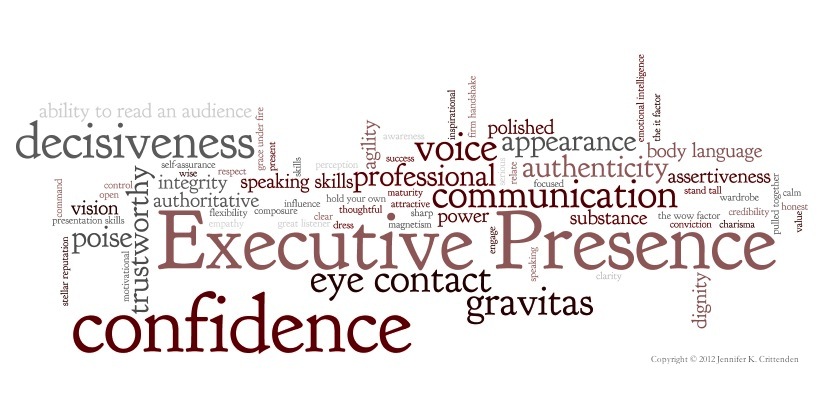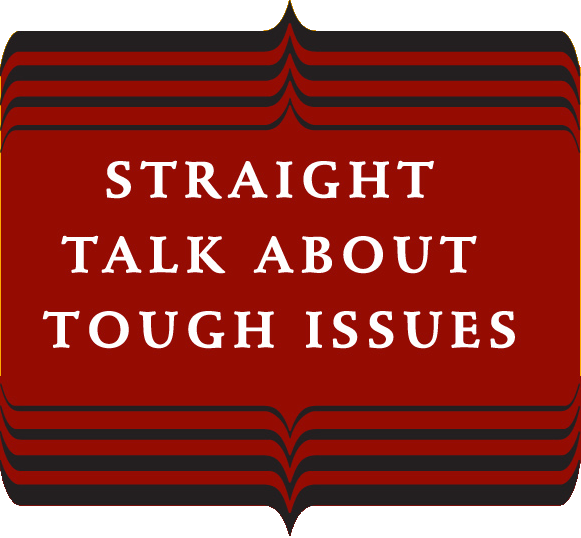We sometimes leave our sense of humor at the door when we come to work. We have an uneasy sense that humor isn’t appropriate in the workplace and “joking around” will detract from our presence. To some extent that’s true. Jobs, careers, and financial compensation are no joking matters, and your professional plays a powerful role in what others think of you and is a significant factor in your career success.
When used correctly, humor can be a fabulous addition as you put together your personal style and create your own presence. A sense of humor is widely admired in the U.S., and humor can be a great tool to show humility, encourage a team, or smooth over a rough situation. It must be used wisely with great sensitivity to the context and to the environment.
Sometimes, a smile, especially during a stressful time, can contribute to your presence, by conveying a calm and balanced perspective. Smiling at someone else’s joke or humorous comment shows your willingness to share the limelight and your ability to listen well. Witty comebacks can promote a sense of fun in the workplace as long as they are inclusive and kind. Participating in joke-telling can build camaraderie although some caveats are in order which we will see.
Humor can add to your reputation in a positive way as people continue to relate stories about you, sometimes long after you have moved on. Witticisms by John F. Kennedy and Winston Churchill are still quoted and appreciated. Warren Buffett’s self-deprecating humor and plainspoken advice contribute to his mystique as a wise investor. And although the former CEO of Groupon, Andrew Mason, got into trouble with some of his attempted humor, his candid style contributed to his popularity with his employees. Steve Forbes, along with his father, Malcolm, is widely quoted, and some of their comments are mildly amusing.
Which brings us to an important point about humor in the workplace: you don’t have to be hilarious. Most workplaces are so serious that a simple lighthearted attitude can go a long way to alleviating tension and stress. Sometimes just saying something in a funny voice or using a bit of slang that your younger employees wouldn’t expect you to know can introduce a bit of levity. You’re not a stand-up comic, and you shouldn’t be trying that hard. But work often is funny, and acknowledging that reminds your employees that we’re just human beings, trying to get along and accomplish something. Keep your expectations reasonable. You’re not going to turn into Jon Stewart overnight.
In fact, surprisingly, in my experience, the worst humor mistakes are often made by executives who consider themselves quite funny. People, especially guys, who have successfully used humor in their private life, the locker room, or in college, have sometimes come to depend on a certain kind of humor that simply falls flat in the workplace. So, if you don’t consider yourself a comic genius, your humbleness may allow you to use humor more successfully because you will be more deliberate and thoughtful.
Here are Five Golden Rules to keep in mind as you think about developing your humor skills:
-
Rule #1: Be nice.
Smirkiness, snarkiness, and comments that alienate a portion of your employee base, may get you a laugh from some, but if it comes at the expense of someone, it detracts from your exceptional presence, instead of bolstering it. The objective of humor in the workplace to be inclusive and leave your audience with the sense that we are all in this together. Think carefully about the message that your humorous comment sends, and be sure that it’s not mean.
-
Rule #2: Be genuine.
Humor will work most effectively for you if it is spontaneous and uncontrived. Telling an obligatory joke when you aren’t in a cheerful mood is uncomfortable for everyone, and co-workers can tell when you are reaching for something that you don’t feel. If you think something is funny, go ahead and say so. Even if others think it’s a bit off-the-wall, they’ll get a kick out of your enthusiasm. Laughter is infectious and great medicine in the workplace.
-
Rule #3: Be smart.
Sometimes you hear about an attempt at humor at work, and you wonder What were they thinking? The problem is that they weren’t. Think critically about how your audience will respond to your comments. If you have to apologize on the spot or defend yourself by saying “I’m just JOKING,” that is not funny, and you have made a mistake. Some of these doofus moves reflect, not so much a lack of judgment, as not bothering to use one’s brain at all. Put yourself in the shoes of your audience and mull through how the humor will come across. Don’t assume that your political views or biases are necessarily shared by your employees, so jokes depending on that kind of common viewpoint aren’t going to work. Many jokes that come from the bar or locker room are doomed to fail at work.
-
Rule #4: Be humble.
The comic figure may be you. Employees love self-deprecating humor in their leaders. It’s a wonderful way for you to poke fun at yourself and show that you don’t take yourself too seriously. Your co-workers hope to relate to you, and humor can be a fine way to let them see the real you—a person who has a lot in common with them. You don’t have to call yourself an idiot or recount a really embarrassing incident, but a mild acknowledgement that you make mistakes and don’t know everything is humble and honest. When you are in a position of power, humility is a magic way to access the funny side of your presence.
-
Rule #5: Some things aren’t funny.
You would think that no one would be so insensitive as to joke about layoffs or corporate shakeups, but unfortunately, sometimes leaders get very confused and turn to gaiety to relieve themselves of the somber burden of communicating bad news. Kidding around about people’s jobs or paychecks is completely inappropriate, and yet we see executives make this mistake. If you are a senior manager, employees are acutely aware of your relative financial security, and emphasizing the difference between you and them by talking carelessly about employment is cruel.
It is fairly easy to avoid making mistakes with humor at work. Too often, we err on the side of avoiding humor because we are concerned about offending someone. It would be far better to apply these rules and take a chance. Humor is a subtle and enjoyable way to bond with your employees and create a happier work environment. As you build your leadership style, consider mixing in a slice of humor to put a special shine on your exceptional presence.
Copyright © 2014 Jennifer K. Crittenden
Sign up for an individualized program to enhance your own Presence:
Creating Exceptional Presence
The program includes self-assessments of areas related to authority, credibility, authenticity, trust, composure, and confidence. Tactical lessons include voice, body language, social and language skills. Context-specific behaviors are identified, studied, evaluated, and practiced. Individual coaching is provided in ten 90-minute video-Skype sessions, followed by readings and exercises, including audio and video analysis of self and others. Participants will receive Crittenden’s new handbook Creating Presence (Whistling Rabbit Press, 2013), addressing such topics as behaviors versus perceptions, derailers, stage fright, and pre-performance rituals. Program time totals 56 hours, typically over six months. The cost is $3000. More information here.





 Ten 90-minute individualized sessions. Private and confidential.
Ten 90-minute individualized sessions. Private and confidential.

